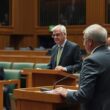A proposal by Chancellor Friedrich Merz of the Christian Democratic Union (CDU) for a mandatory societal service year is facing criticism from the Social Association Germany (SoVD) and opposition parties.
The SoVD argues that voluntary social engagement holds greater value than a compulsory service year. Michaela Engelmeier, the organization’s chairperson, emphasized to the “Rheinische Post” that activities undertaken voluntarily are frequently performed with greater dedication than tasks perceived as obligatory. She advocated that the state should prioritize motivation over compulsion.
Concerns were raised regarding current reductions in the existing Federal Volunteer Service program. Engelmeier highlighted that the program significantly shapes the lives of participants, with approximately 70% subsequently pursuing careers in the social sector. She deemed the cuts, particularly within the context of a growing skills shortage, as “a catastrophe” warning that vulnerable individuals would be disproportionately affected by the loss of available places.
The suggestion to include retirees in the proposed service year is also problematic, according to Engelmeier, as it arises from the limited availability of working-age individuals. While she acknowledged the importance of solidarity across generations, she cautioned against mandating service for individuals who have already made substantial contributions throughout their careers, many of whom already engage in voluntary work. She believes such existing efforts should be recognized and encouraged, rather than enforced.
Britta Haßelmann, parliamentary group chair of the Green Party, also rejects Chancellor Merz’s proposal. She asserted that an extended debate on compulsory societal service models, which would necessitate a fundamental law amendment, is unnecessary. Instead, she advocates for strengthening existing voluntary services and encouraging engagement in various social and ecological areas, including technical relief organizations and fire departments.
Haßelmann specifically pointed to the potential to attract volunteers, particularly within the armed forces, emphasizing the need to make the Bundeswehr a more appealing employer. She championed a proactive strategy focused on voluntary participation as the most effective means of strengthening societal cohesion.
The Social Democratic Party (SPD) currently sees no realistic path towards implementing Chancellor Merz’s proposed societal service year. Parlimentary Secretary Dirk Wiese told the “Rheinische Post” that the introduction of a mandatory system requires a two-thirds majority in the German Parliament, a threshold that is currently unlikely to be reached. He suggested expanding voluntary military service with substantial financial incentives – potentially up to €2,300 net per month – as a more viable alternative.
Jan van Aken, leader of the Left Party, already dismissed the prospect of a fundamental law amendment to enable compulsory service. Achieving the required two-thirds majority would necessitate the support of the governing parties, CDU and SPD, as well as the Alternative for Germany (AfD).





